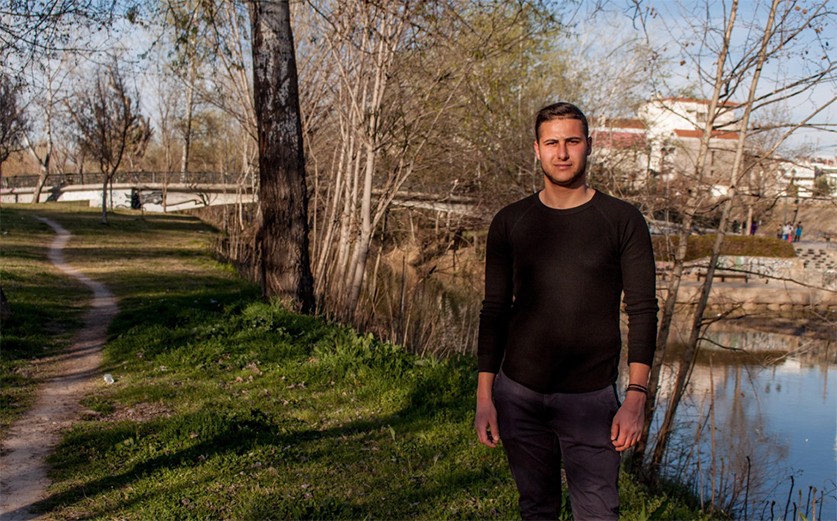Meet Dimitris
Dimitris Theodorakis, 20, was born and lives in Larissa. He is a beneficiary of the apiculture training seminars implemented by the Agricultural University of Athens (AUA) as part of the “New Agriculture for a New Generation” (NANG) program. He is a third-generation farmer, and he and his father cultivate apples, cherries, and chestnuts on 20 stremmata in the village of Agia. “I’ve worked in the fields with my father and learned from him since I was a child,” Dimitris said. “Because of all the technology nowadays, young people are losing touch with nature. They can’t tell whether or not an apple is good.” Dimitris decided to become an agronomist to continue the work of his father. He is in his second year at the Technological Educational Institute (TEI) of Thessaly in the Department of Agricultural Engineering Technologists.
Dimitris and his father are trying to cultivate new crop varieties that he learned about at TEI since the price of apples has fallen in recent years. Larissa’s intense summer and winter temperatures also create difficulties for the farmers. Snow freezes the trees and hail can destroy a cultivation. “We’ve grown cherries for more than 50 years,” Dimitris said. “I also want to start growing dry nuts like walnuts.” He thinks that chestnuts are the best crop because they fetch a good price in the market. The chestnut trees are 20 years old and grow up on the mountain with a view of the sea. The family grows Smith and Gala apples in a separate, lower field. The oldest tree is 27 years old. “It will soon need to be replaced in order to produce a better quality and quantity of apples,” Dimitris said. “It takes 4-5 years for a young tree to yield a full production.” From May until October, he and his father work nonstop, harvesting first the cherries, then the apples, and then the chestnuts. “I’m happy to work in nature,” Dimitris said. “It calms me, and you never stop learning.”
Participating in the Apiculture Program
Dimitris developed his initial interest in beekeeping by watching videos online and talking with friends who work as beekeepers. “You can create many products with bees like honey and propoli,” he said. “When you grow apples, you only have apples. Bees can also improve the quality of our crops by pollinating them. I plan to have about four hives per stremma.”
Dimitris heard about the apiculture training seminars from an acquaintance. The seminars take place at Averofios Farm School, which is older than TEI and has bee hives that the program uses for demonstrations. “We started from the very beginning: how to set up and paint a hive,” Dimitris said. The 20 participants spent half their time inside the lecture hall learning theory and the other half outside doing practical training in the field. They each received a textbook written by Professor Harizanis that details everything they need to know about beekeeping as well as access to notes, internet resources, and over 55 instructional videos created by Harizanis and his lab. “When you’re learning something new, you need to read a lot. There’s no other way,” Dimitris said. He already has 24 hives, but he’s waiting for the next seminar before he gets his bees. “You need to gain the knowledge to do something right. You can’t go into it blind.”
“The first thing I want to do is to produce and perfect honey,” Dimitris said. “Then, with the help of my older sister who lives in England, I’d like to sell it abroad. My father will help me with the beekeeping. I’m excited to share my knowledge with him.”

